No. 10, Sri Labdi Colony in Chennai is bustling with activity as preparations are on for the celebration of Samanvay – 50 years of the Chidambaram Academy of Performing Arts (CAPA). It is the elegant home of Bharatanatyam exponent, guru and arts administrator Chitra Visweswaran, who steps into her 75th year on October 12. It also doubles up as the artistic space for CAPA.
Like the famous female trinity in Carnatic music, the names of veteran dancers Padma Subrahmanyam, Sudharani Raghupathy and Chitra Visweswaran come to mind in the field of natyam.
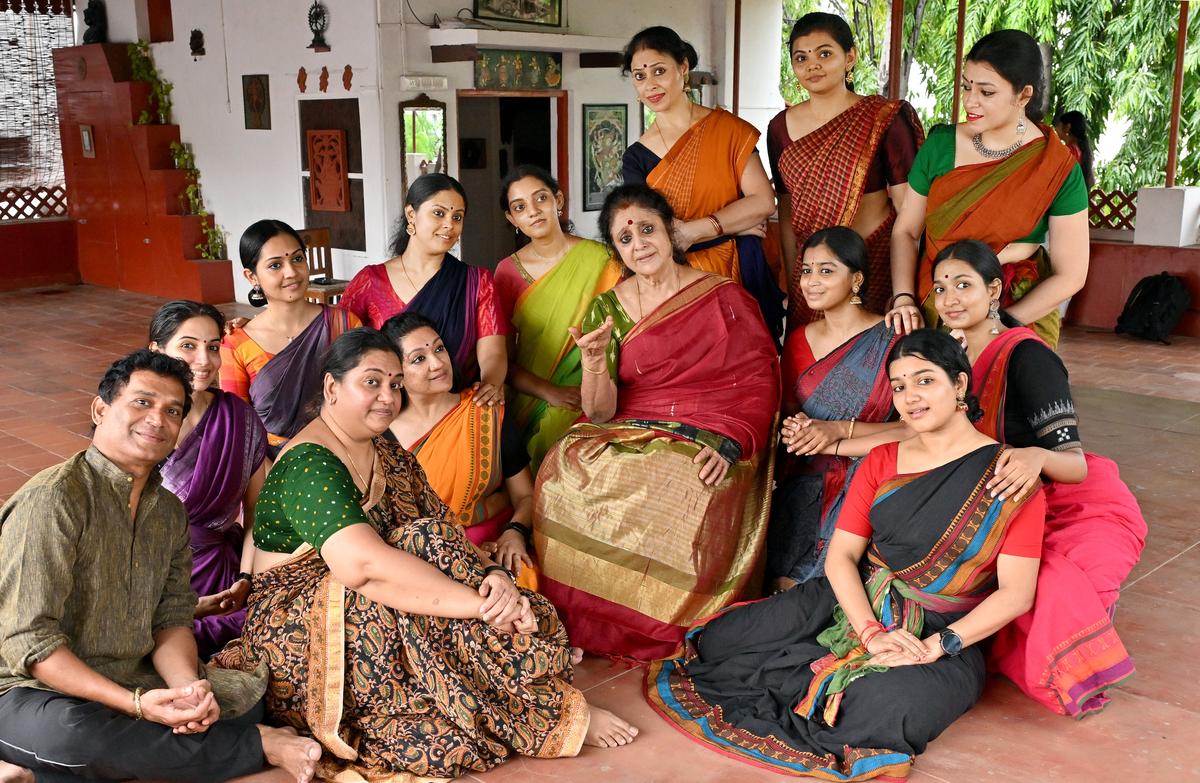
Dancer Chitra Visweswaran and her students at the Chidambaram Academy of Performing Arts.
| Photo Credit:
RAVINDRAN R
Chitra says, “Ever since I can remember, dance has been an intrinsic part of my existence”. She was initiated into dance at the age of three, by her mother Rukmani Padmanabhan, and then put through her paces in Western classical ballet in London. An eclectic background covering Manipuri, Kathak, Rabindra nritya and sangeet, Carnatic music and theatre, propelled Chitra on an artistic voyage of discovery at a young age in Kolkata. At the age of 10, she came under the tutelage of Tiruvidaimarudur T.A. Rajalakshmi and had her arangetram on April 12, 1962.
Advanced training
In 1970, after graduating in English Honours from Calcutta University, Chitra received the National Scholarship for advanced study in Bharatanatyam from the Government of India. She therefore relocated to Madras and spent four years learning from the doyen Vazhuvoor Ramaiyya Pillai. “If T.A. Rajalakshmi laid a strong foundation of grammar and technique, Vazhuvoorar awakened me to unimaginable, heights of creativity. His teaching methods were very unorthodox. A great visionary, vadyar never viewed or taught Bharatanatyam at a mere physical level. He used analogies and awakened one to seek inspiration from Nature and life. ‘Think, think!’ he would say. To this day I follow his approach while teaching. At CAPA, it is my endeavour to help my students develop the seeing eye, the hearing ear and the thinking mind as well.”
The scholarship period had ended and Ramaiyya Pillai was unable to travel to conduct Chitra’s concerts. On a somber note she recalls: “After much emotional trauma on both sides, he finally agreed to allow me to work independently, but circumstances prevented him from according permission for anyone else to perform nattuvangam for the pieces he had taught me. Those days there were hardly any freelance nattuvanars. So there I was, out on a limbo, with barely a month to go before my next performance. With this, a new chapter in my life began. I worked on fresh margams and extension of repertoire. And given my background, I set out on a voyage of discovery, to widen my horizons in my chosen field.”
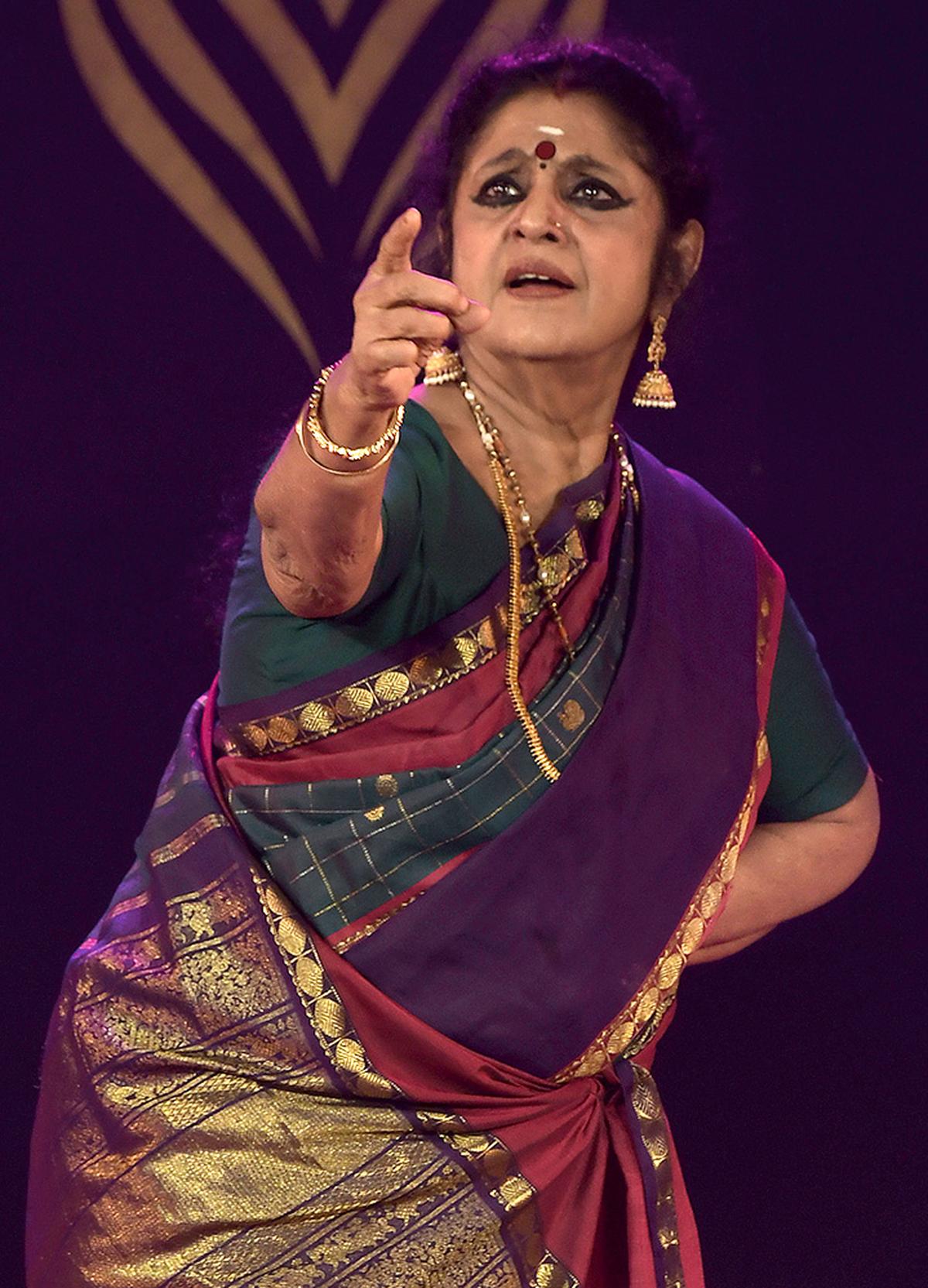
With training in myriad dance genres, Chitra Visweswaran developed an individualistic philosophy of movement.
| Photo Credit:
VEDHAN M
Soon, Chitra chartered her own course combining all that she had imbibed from her gurus and her knowledge of the cognate forms of arts, imbuing them with a scholastic approach and developing an individualistic philosophy of movement. She was among the first to tour extensively abroad, and in the process equipped herself and her students in nattuvangam, acoustics and lighting design in a professional way.
Her husband, R. Visweswaran, gave up a corporate career to totally involve himself in music. With his knowledge of the Carnatic and Hindustani systems as also Western classical, he started singing and composing music for her dance. Together they created several solo pieces, thematic presentations and group productions. Her style stands out for its verve, light leaps, flowing movements punctuated by pulsating pauses, quicksilver head and eye movements, play of rhythm and cross rhythms, mimimalistic yet elegant jewellery and costumes, and intelligent coverage of space, subtle yet communicative abhinaya — all conveying the joy of dance.
Launching dance class in Chennai
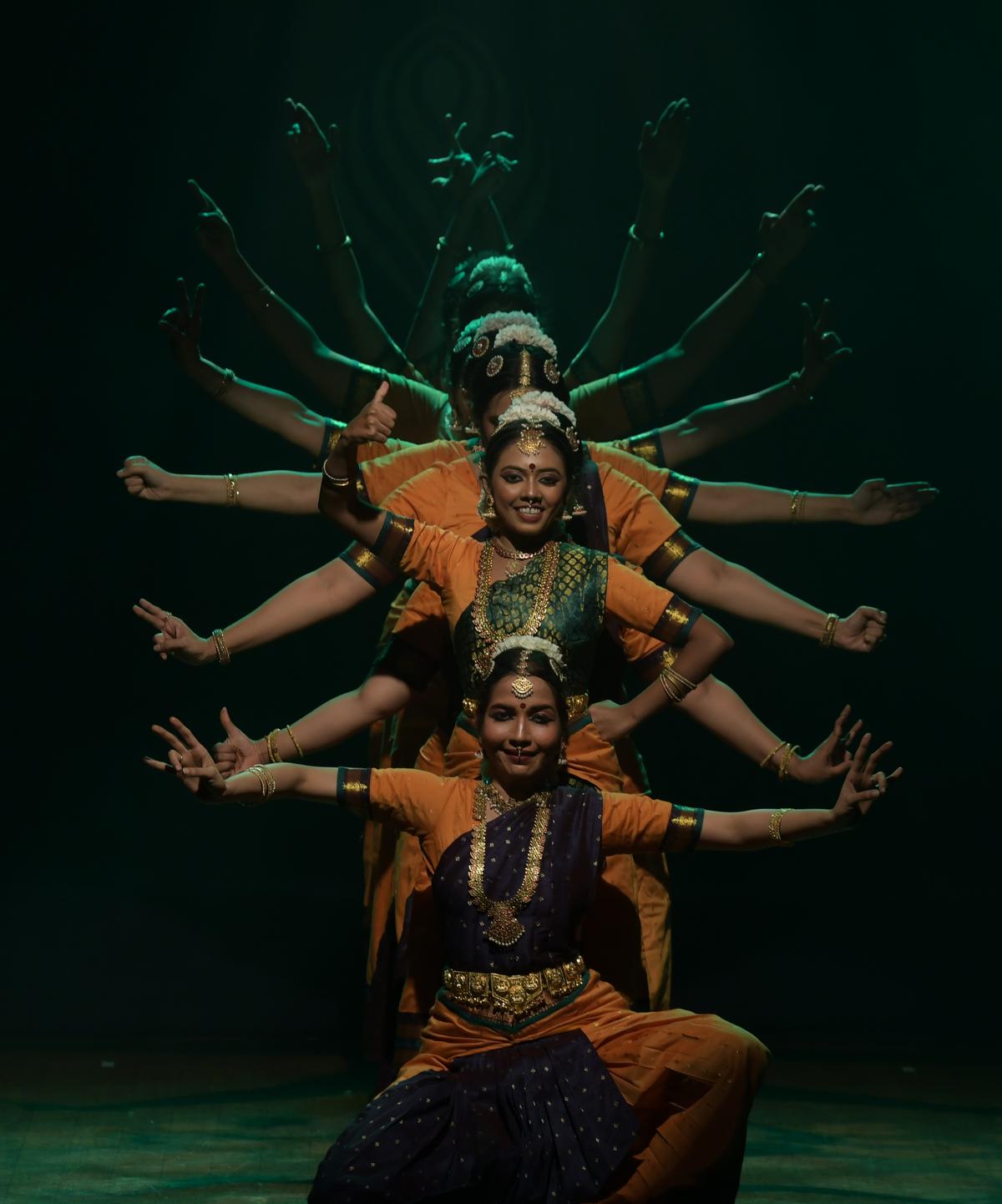
Chitra Visweswaran’s ‘Skaandam’ performed by her students at Sri Krishna Gana Sabha, T. Nagar on December 28, 2022.
| Photo Credit:
VEDHAN M
Fifty years ago, two years after her marriage to the multi-talented R. Visweswaran, the idea of starting dance classes in Chennai had taken shape in August 1974, with the support of her parents. Chitra launched her dance classes in an informal way in the drawing room of her house which too has evolved over time along with her successful and fulfilling career in classical dance. Every time the furniture in the room would be cleared for the seven or eight children who attended the classes. Within a year, the space for dance was formalised aptly as the Chidambaram Academy of Performing Arts.
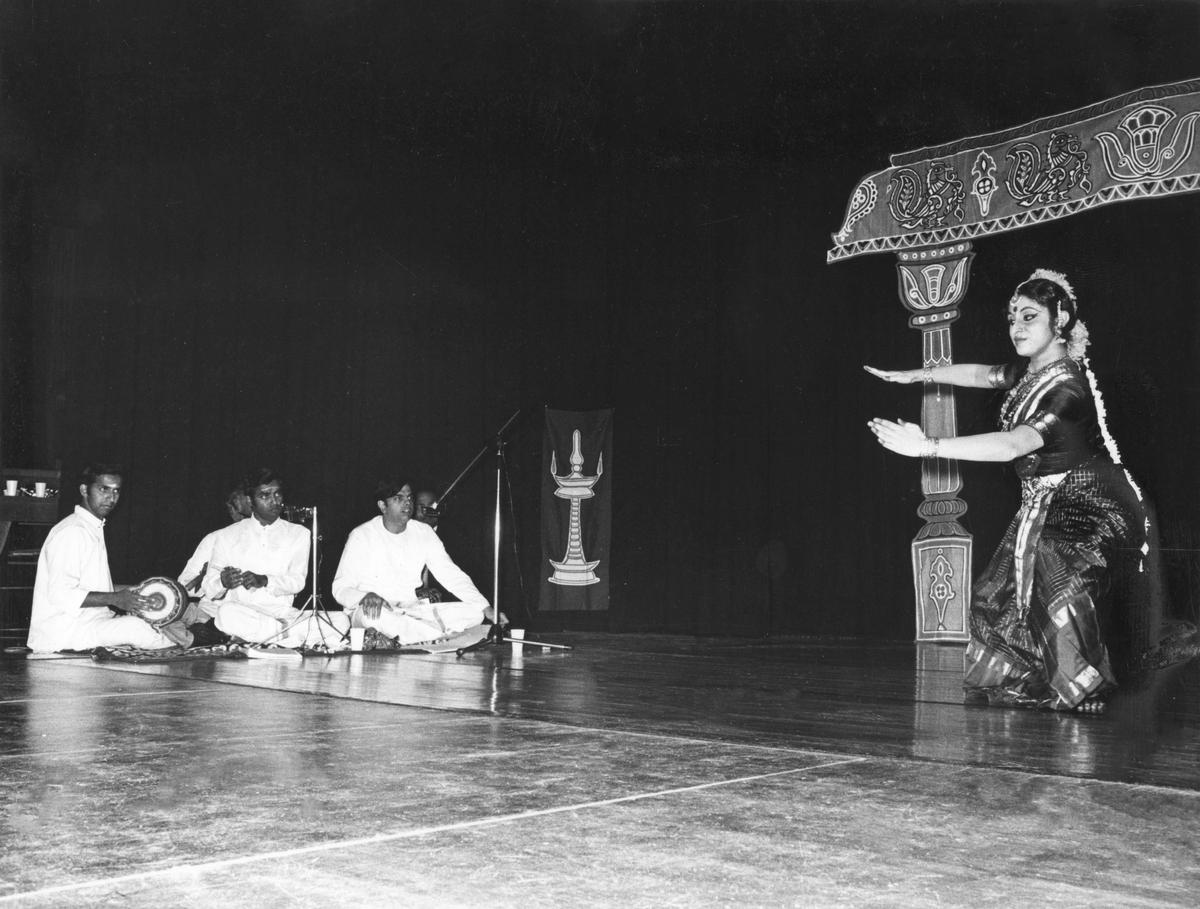
One of the earlier performances by Chitra Visweswaran at Bonn in 1981.
| Photo Credit:
The Hindu Archives
Chitra was a popular and busy artiste presenting as many as 20 performances a month in India and abroad, but teaching was her passion and she intelligently divided her time between dancing and teaching. As the number of students grew, the dance class got promoted from the drawing room to a more spacious and convenient dance hall on the first floor. Now, on the occasion of its golden jubilee, lectures are also being organised in the ‘Terracotta Terrace’ aesthetically designed atop the house — suitable for chamber concerts.
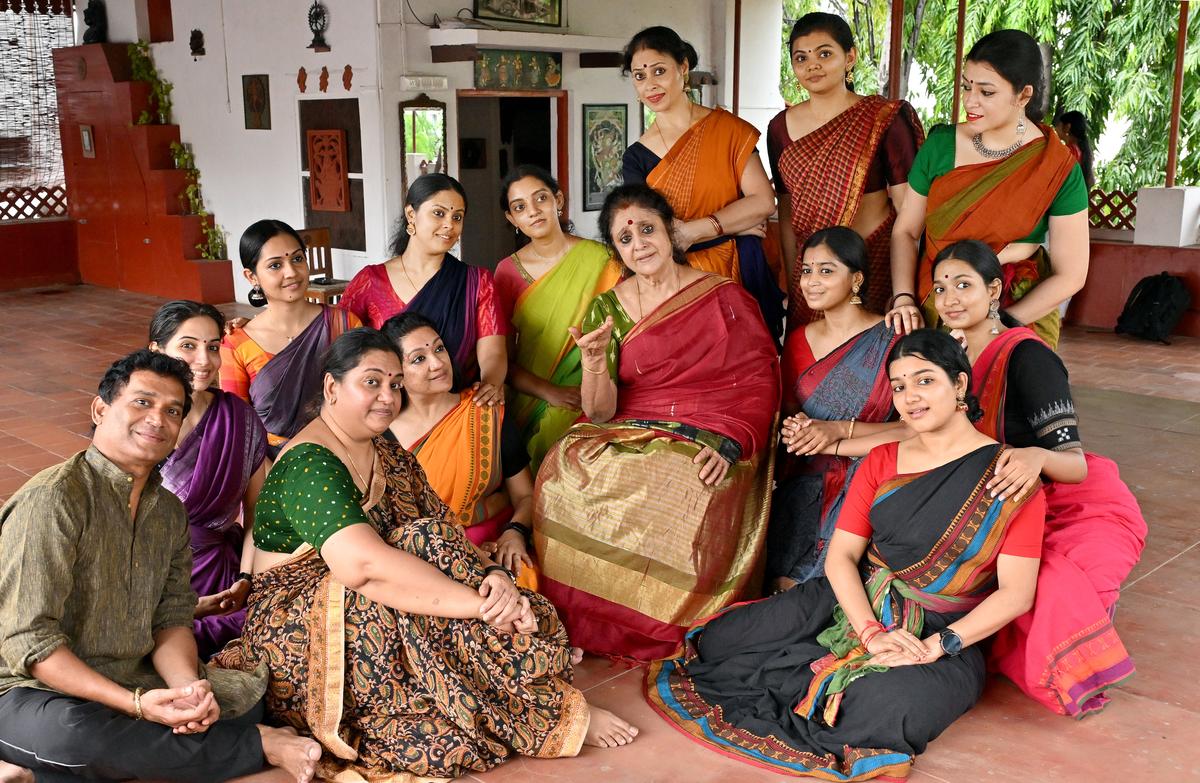
Dancer Chitra Visweswaran and her students at CAPA, who will presenting Samanvay in Chennai.
| Photo Credit:
RAVINDRAN R
As the institution enters its 50th year, CAPA is curating a series called Samanvay. “I have always perceived art as a complete whole. It is this Samanvay that I have chosen to establish through this festival, bringing varied experiences through different genres. In this joyous festival of natyam, sangeetam, the spoken word, poetry and puppetry, exemplary artistes are coming together to bring us this experience of togetherness,” explains Chitra.
Sukanya Ravindhar, director, Chidambaram Dance Company and a senior disciple of Chitra, who has been conducting the rehearsals, chips in saying, “We feel a deep sense of pride in continuing to share the artistry imparted by our guru. Samanvay brings together the rich influences that define our legacy.”
Some milestones
Chitra Visweswaran first composed a dance piece at the age of 11, and choreographed the life of saint Tyagaraja as a varnam when she was 13.
As a teenager, she introduced the concept of announcements on stage during her performances in Kolkata in the 1960s.
She was among the first dance teachers to train her students to do nattuvangam.
Having trained in lighting and lighting design under the legendary Tapas Sen in Kolkata, even as a teenager Chitra incorporated the concept of using lighting as an integral part of choreography.
Samanvay – art confluence
‘Samanvay – a confluence’ will feature Dushyanth Sridhar, Anupama Hoskere, Sikkil Gurucharan and Anil Srinivasan, and the Chidambaram Dance Company, on September 28 and 29, at Bharatiya Vidya Bhavan, Mylapore, Chennai.
The event is held in partnership with Bharatiya Vidya Bhavan, Chennai Kendra, The Ministry of Culture, and Shreya Nagarajan Singh Arts Development Consultancy.
Published – September 27, 2024 10:17 am IST

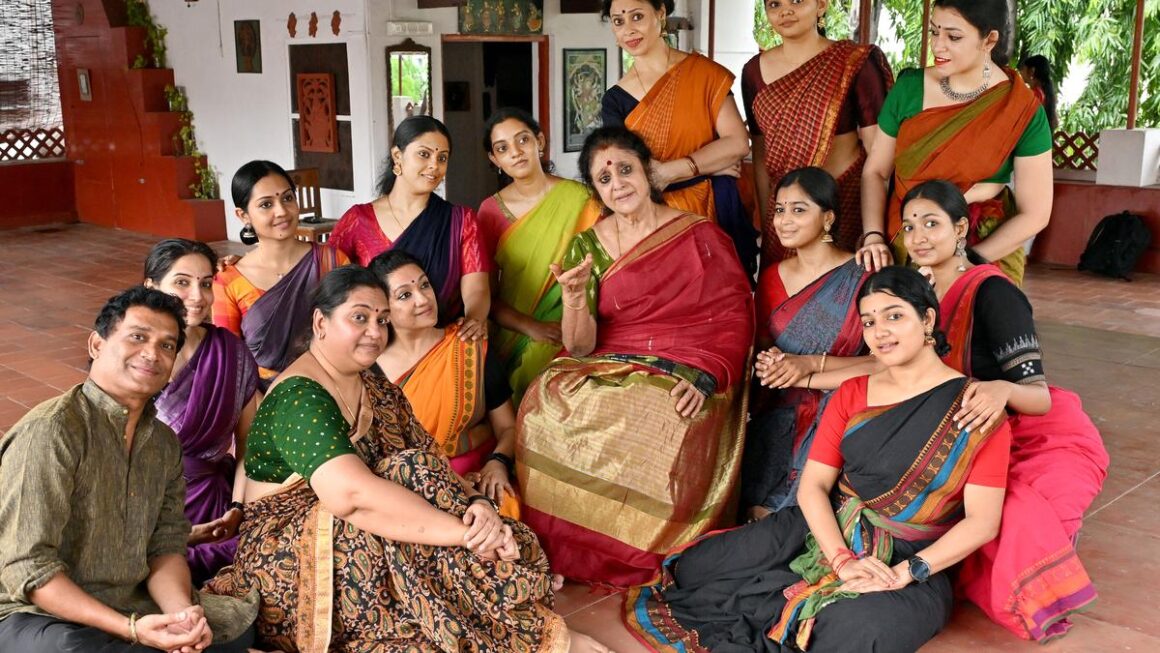
Leave a Reply